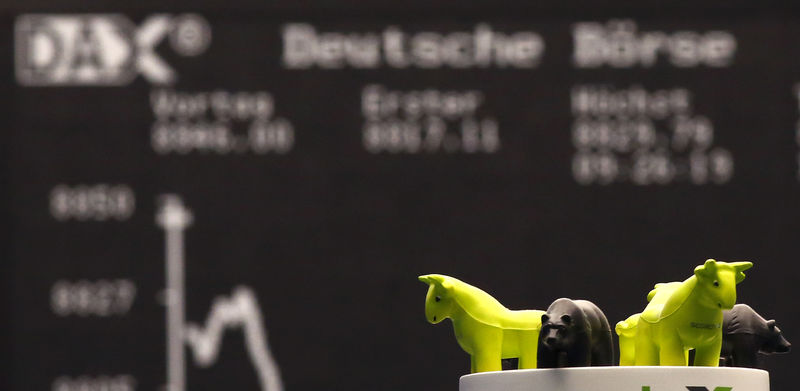By Peter Nurse
Investing.com - European stock markets are seen trading in a mixed fashion at the open Friday, helped by further signs of a global economic recovery but concerns about the region’s Covid vaccination program remain.
At 3:10 AM ET (0710 GMT), the DAX futures contract in Germany traded 0.2% lower, while CAC 40 futures in France climbed 0.1% and the FTSE 100 futures contract in the U.K. rose 0.2%.
Earlier Friday, China reported that its March factory gate prices rose at their fastest annual pace since July 2018, climbing 4.4% year-on-year, far above February’s 1.7% growth.
Although China set a modest GDP growth target of above 6% for 2021 earlier in the year, many expect the Asian economic super power’s growth to exceed 8%.
Back in Europe the economic news was less impressive, as Germany’s industrial production slumped 1.6% on the month in February, according to data released Friday, below the expected growth of 1.5%.
"It would need an explosion of manufacturing and construction activity in March to prevent the German economy from falling into contraction in the first quarter of the year," ING analyst Carsten Brzeski said in a note to clients.
Adding to these concerns has been growing worries over the safety of one of the most prominent vaccines against the virus.
Italy, Spain and Belgium have joined other European countries in limiting the use of the AstraZeneca (NASDAQ:AZN) vaccine, even after the European Medicines Agency on Wednesday repeated that the benefits of the drug outweigh the risks of very rare cases of blood clots.
The lack of common guidelines within the EU over the use of the drug can only increase public hesitancy, slowing the chance of the region achieving widespread vaccination.
The concerns over this vaccine will make sure AstraZeneca remains in the spotlight Friday, especially after Australia announced it would be ordering 20 million extra doses of Pfizer’s rival drug, in a pivot away from the British-Swedish drug maker.
Oil prices drifted Friday, with traders trying to digest the competing influences of rising supplies and a global economic recovery that is gradually gathering steam.
U.S. crude futures traded 0.1% higher at $59.63 a barrel, while the Brent contract fell 0.2% to $63.07.
Both contracts are on track to post a drop of between 2% and 3% this week following the decision late last week by the Organization of the Petroleum Exporting Countries and its allies, including Russia, to gradually increase supplies by 2 million barrels per day between May and July.
Elsewhere, gold futures fell 0.5% to $1,749.90/oz, while EUR/USD traded 0.2% lower at 1.1891.
